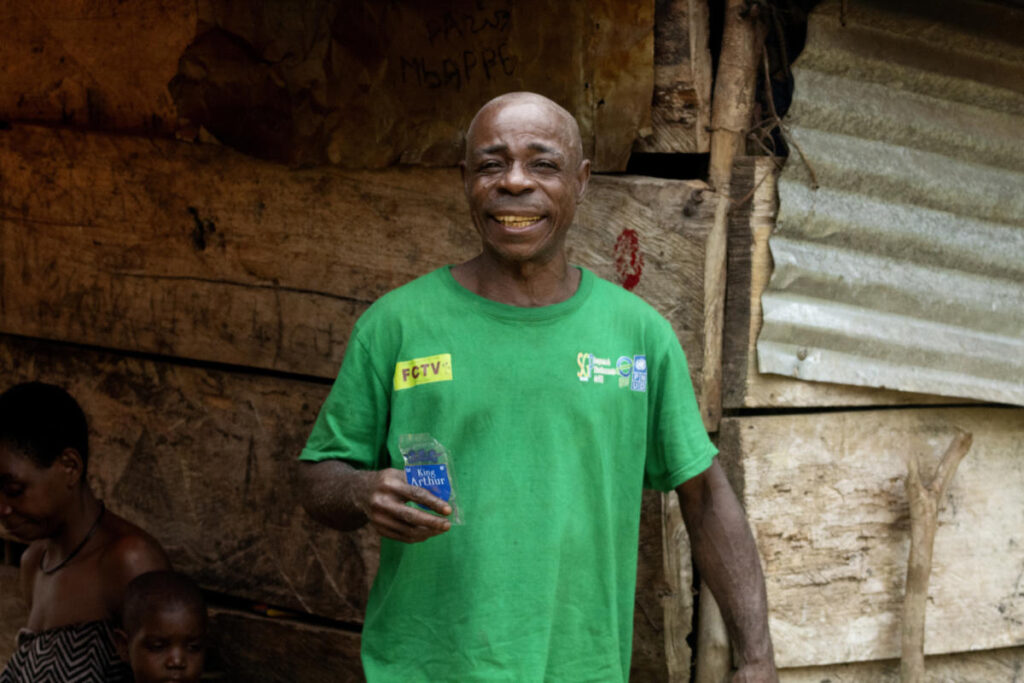MAYOS, Cameroon (AP) — The morning sun shone through the forest canopy, casting a dappled light on this Cameroonian village. For the Baka indigenous community, it was a timeless sight.
But a passing truck broke the silence, kicking up clouds of dust, a reminder that the Baka now live a troubled life on the side of the road after being forced from their traditional homes.
The Baka and fellow Bagyieli indigenous people have lived in harmony with the forests of Central Africa for generations. But mining and logging activities are increasing, along with protected areas, and government policies are aimed at integrating the ethnic groups into mainstream society.
Life “was better when we were in the forest,” said Rebecca Gwampiel, a 78-year-old Baka. She prepared yam porridge outside a traditional hut built of bent saplings. In the dusty courtyard, children played soccer with tied banana leaves.
Among them was Francis, an 11-year-old who quickly adapted to the new life and had aspirations. “I want to be a nurse,” he declared. “I want to be able to treat my grandmother when she is sick.”
But for many Baka children, such dreams remain unfulfilled. Their lack of birth certificates is a significant barrier — part of a broader global problem. They never saw the need for birth certificates when they had little interaction with the world outside the forest. Even now, they live far from administrative centers and can rarely afford transportation to reach them.
“Without a birth certificate, he’s stuck here in the village with me,” said Francis’ father, Bertrand Akomi, 61. He himself was turned away by a timber company because he didn’t have a birth certificate.
The document remains elusive for the more than 120,000 members of Cameroon’s Baka and Bagyieli communities. Without birth certificates, they cannot obtain national identity documents and are excluded from the full benefits of citizenship.
“If births are not registered, how can you identify yourself as a Cameroonian?” asked Banmi Emmanuel Dingha, chairman of the Foreign Affairs Committee of the National Assembly of Cameroon. He called the document crucial for access to education, health care and employment.
There is hope for change. Earlier this summer, Dingha and colleagues in Cameroon’s parliament passed a bill that would allow the country to accede to two United Nations treaties regarding the recognition of stateless persons.
This would “help to significantly reduce discrimination against people who are often simply victims of their circumstances,” the government said at the time.
Cameroon’s actions are part of a commitment made by African countries earlier this year to address the right to nationality and eradicate statelessness on the continent, home to more than 1.3 billion people.
The indigenous population of Cameroon is mainly hunter-gatherer, accustomed to easily crossing lightly guarded international borders in search of food and game.
“The Bakas are not just in Cameroon. You find them in Congo, you find them in the Central African Republic, you find them in Gabon, you find them in Equatorial Guinea. And many of them move through forests that span all of these countries,” Dingha said.
Sebastian Bissolababa, a teacher at a government school in Mayos, stressed the urgency. Many Baka students are unable to progress to secondary education or beyond, and companies often demand identification, closing off another route to integration into society.
The Bagyieli indigenous people, who live some 590 kilometres away in the southern Campo region, face similar challenges.
There came Henri Lema from the village of Nazareth, returning from hunting, with a porcupine on his spear. He was helping his wife, Bilore Marie, prepare the evening meal.
As he cut the porcupine into pieces, he expressed his frustration over the lack of identification documents and the problems this caused with paramilitary forces and other authorities.
“Every time I have to travel to Kribi (the district administration), I am harassed by gendarmes because I don’t have an ID card,” he said. “I have to pay bribes every time. And that is money that I don’t have at all.”
Simplice Nguiamba is a senior government official responsible for, among other things, ensuring that the Bagyelis in Campo have access to nationality documents.
“In concrete terms, our actions are based on awareness-raising, advocacy, monitoring and support of Bagyelis,” he said.
Other groups of Cameroonians are also at risk of becoming stateless.
The ongoing separatist crisis in the country’s English-speaking Northwest and Southwest regions and the Boko Haram insurgency in the Far North region have led to internal displacement, with many people losing their birth certificates and national identity cards.
___
For more news on Africa and development: https://apnews.com/hub/africa-pulse
___
The Associated Press receives funding for global health and development reporting in Africa from the Gates Foundation. AP is solely responsible for all content. Find AP’s standards for collaboration with philanthropies, a list of supporters and funded coverage areas on AP.org.







